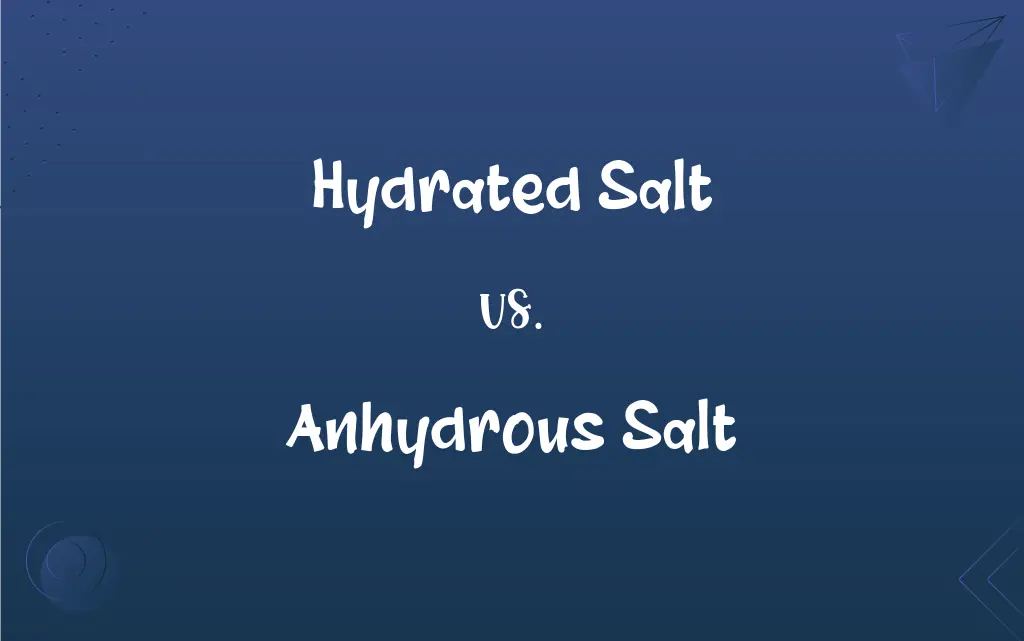Hydrated Salt vs. Anhydrous Salt: What's the Difference?
By Janet White || Published on December 1, 2023
Hydrated salts contain water molecules in their structure, whereas anhydrous salts do not.

Key Differences
Hydrated salts are compounds that include water molecules as an integral part of their crystal structure. Anhydrous salts, on the other hand, lack these water molecules and have a dry, often powdery texture.
The water in hydrated salts is not merely surface moisture but is chemically bonded to the salt. While, anhydrous salts have had this water removed, often through heating, resulting in a more concentrated form of the salt.
In hydrated salts, the water molecules can influence the salt's physical properties, like its color and melting point. However, anhydrous salts typically have different physical characteristics due to the absence of these water molecules.
The presence of water in hydrated salts can make them less stable at high temperatures, leading to water loss and conversion to an anhydrous state. Whereas, anhydrous salts are more stable under such conditions.
Hydrated salts are often used in applications where moisture content is beneficial, such as in certain chemical reactions. Anhydrous salts are preferred in situations where water could interfere with a process or reaction.
ADVERTISEMENT
Comparison Chart
Water Content
Contains water molecules in its structure
Lacks water molecules
Texture
May be crystalline and less powdery
Often powdery and dry
Chemical Bonding
Water is chemically bonded
No water to bond with
Physical Properties
Influenced by water content (e.g., color, melting point)
Different due to absence of water
Stability
Less stable at high temperatures
More stable at high temperatures
ADVERTISEMENT
Hydrated Salt and Anhydrous Salt Definitions
Hydrated Salt
Hydrated salt is a salt molecule bound with water.
Copper sulfate pentahydrate is a common hydrated salt.
Anhydrous Salt
Salt that has had its water content removed.
Anhydrous copper sulfate turns white when dehydrated.
Hydrated Salt
A chemical compound where water is an integral part of the crystal.
Hydrated lime is used in construction.
Anhydrous Salt
Anhydrous salt is a salt without water in its structure.
Anhydrous calcium chloride is used for moisture control.
Hydrated Salt
A salt that has water chemically combined with it.
Gypsum, a hydrated salt, is used in drywall.
Anhydrous Salt
A dry salt compound free from water molecules.
Anhydrous sodium sulfate is used in detergents.
Hydrated Salt
A crystalline substance containing water molecules.
Epsom salt is a hydrated salt used in baths.
Anhydrous Salt
A concentrated salt form without hydration.
Anhydrous magnesium chloride is used in various chemical reactions.
Hydrated Salt
Salt that retains water within its molecular structure.
Hydrated ferric chloride is used in water treatment.
Anhydrous Salt
A salt existing in a water-free form.
Anhydrous ammonia is used in industrial refrigeration.
FAQs
Why is hydrated salt often less stable?
The water in its structure can be lost at high temperatures.
How do you store anhydrous salts?
In a dry, moisture-free environment.
Is the color of a hydrated salt different from its anhydrous form?
Often, yes, due to the presence of water.
Can anhydrous salts be rehydrated?
Yes, when exposed to moisture.
Can a hydrated salt become anhydrous?
Yes, by heating to remove water molecules.
Are hydrated salts used in industrial applications?
Yes, especially where moisture content is beneficial.
Can hydrated salts dehydrate naturally?
Yes, in dry conditions or over time.
What is a hydrated salt?
A hydrated salt is a compound containing water molecules within its crystal structure.
How is anhydrous salt different from hydrated salt?
Anhydrous salt lacks water molecules in its structure, unlike hydrated salt.
Are the chemical properties of hydrated and anhydrous salts different?
Yes, due to the presence or absence of water.
Is anhydrous salt always dry and powdery?
Typically, but it depends on the specific salt.
What are common uses of anhydrous salts?
In drying agents, chemical reactions, and industrial processes.
Why are anhydrous salts more concentrated?
Without water, they contain a higher proportion of the salt compound.
Can the hydration level of a salt vary?
Yes, different salts can have varying levels of hydration.
Do hydrated salts play a role in biological systems?
Yes, they can be important in various biological processes.
Can anhydrous salts absorb moisture?
Yes, some can absorb moisture and become hydrated.
Do hydrated and anhydrous salts have different uses?
Yes, based on their physical and chemical properties.
Do hydrated salts have a lower melting point?
Generally, yes, due to the water in their structure.
Are anhydrous salts more expensive?
Not necessarily, it depends on the salt and production process.
Is the texture of hydrated salts always crystalline?
Often, but it can vary based on the specific salt and conditions.
About Author
Written by
Janet WhiteJanet White has been an esteemed writer and blogger for Difference Wiki. Holding a Master's degree in Science and Medical Journalism from the prestigious Boston University, she has consistently demonstrated her expertise and passion for her field. When she's not immersed in her work, Janet relishes her time exercising, delving into a good book, and cherishing moments with friends and family.






































































